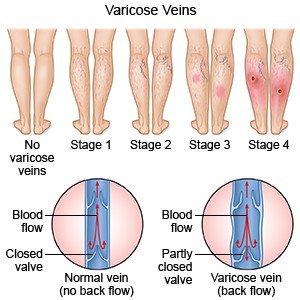Venous insufficiency
Venous insufficiency is a medical condition that can cause discomfort, swelling, and pain in the legs. Compression stockings are an effective treatment option for managing the symptoms of venous insufficiency.
If left untreated, venous insufficiency can lead to more severe complications, such as ulcers or blood clots. It is essential to seek medical attention if you experience any unusual symptoms or discomfort in your legs.

If you have venous insufficiency, your doctor may recommend wearing compression stockings daily. It is essential to put them on first thing in the morning before getting out of bed and wear them throughout the day. You should remove the stockings at night to allow your skin to breathe and prevent irritation.
Compression stockings work by applying graduated pressure to the legs, with the highest pressure at the ankle and gradually decreasing up the leg. This pressure helps to improve circulation and reduce swelling, pain, and fatigue in the legs. Compression stockings can also help prevent more serious complications, such as blood clots.
Types of Compression Stockings
There are several different types of compression stockings available, ranging from mild compression (8-15 mmHg) to extra-firm compression (30-40 mmHg). Your doctor will determine the appropriate level of compression based on your individual needs. Compression stockings are available in various styles, including knee-high, thigh-high, and pantyhose, and come in different colors and materials.
Compression stockings are generally safe and well-tolerated, but they may not be suitable for everyone. If you have certain medical conditions, such as peripheral artery disease or diabetes, talk to your doctor before using compression stockings. Additionally, if you experience any unusual or severe symptoms while wearing compression stockings, such as pain, swelling, or skin irritation, consult your medical provider.
In addition to wearing compression stockings, there are several lifestyle changes you can make to manage venous insufficiency. Maintaining a healthy weight, regular exercise, and elevating your legs when possible can all help improve circulation and reduce symptoms. Avoiding long periods of sitting or standing and wearing loose-fitting clothing can also help prevent symptoms from worsening.
Compression stockings are a non-invasive and effective treatment option for managing the symptoms of venous insufficiency. They can help improve circulation, reduce swelling and pain, and prevent more serious complications. Talk to your medical provider about whether compression stockings may be right for you and how to properly use and care for them. With the right fit and level of compression, compression stockings can help you feel more comfortable and improve your overall quality of life.